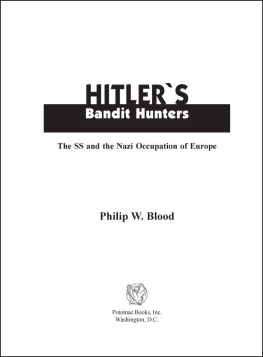HITLERS
Bandit Hunters
Related Titles from Potomac Books
The Forgotten Soldier
By Guy Sajer
Insurgency and Terrorism:
From Revolution to Apocalypse, 2nd edition
By Bard ONeill
Hitlers Ambivalent Attach:
Lt. Gen. Friedrich Von Boetticher in America, 19331941
By Alfred M. Beck
Tannenburg
By Dennis Showalter
Guderian: Panzer Pioneer or Myth Maker
By Russell Hart

An AUSA Book
HITLERS
Bandit Hunters
The SS and the Nazi Occupation of Europe
Philip W. Blood

Published in the United States by Potomac Books, Inc. All rights reserved. No part of this book may be reproduced in any manner whatsoever without written permission from the publisher, except in the case of brief quotations embodied in critical articles and reviews.
Library of Congress Cataloging-in-Publication Data
Copyright 2006 by Potomac Books, Inc.
Blood, Philip W., 1957
Hitlers bandit hunters: the SS and the Nazi occupation of Europe / Philip W. Blood.
1st ed.
p. cm.
Includes bibliographical references and index.
ISBN 1-59797-021-2 (alk. paper)
1. World War, 19391945Occupied territories. 2. World War, 19391945
Destruction and pillageEurope. 3. Internal securityEuropeHistory20th century.
4. Waffen-SS. I. Title.
D802.A2B66 2006
940.541343dc22
2005032891
ISBN-10 1-59797-021-2
ISBN-13 978-1-59797-021-1
Printed in Canada on acid-free paper that meets the American
National Standards Institute Z39-48 Standard.
Potomac Books, Inc.
22841 Quicksilver Drive
Dulles, Virginia 20166
First Edition
10 9 8 7 6 5 4 3 2 1
Geh nicht nach Norden, und hte dich
Vor jenem Knig in Thule,
Ht dich vor Gendarmen und Polizei,
Vor der ganzen historischen Schule.
Dont go North and beware
of the king in Thule,
Beware of gendarme and police
of the historic school.
From the poem Deutschland: Ein Wintermrchen
by Heinrich Heine (1844)
in Atta Troll: Ein Sommernachtstraum,
Deutschland: Ein Wintermrchen.
CONTENTS
FOREWORD
This book does not make for comfortable reading. It is a meticulous examination of Bandenbekmpfung, a term that has much broader and more pervasive meaning than simply antipartisan warfare and that characterized the German approach to security in occupied areas during the Second World War. Philip Blood demonstrates that the concept predated this conflict and actually stretched into Germanys colonial past and its conduct in France in the FrancoPrussian War of 187071. Indeed, by its conception of bandits as microbes hostile to the very existence of the body politic, its roots go deeper, to the Thirty Years War or even to the Roman Empire. But on September 16, 1941, a decree under Keitels signature established Bandenbekmpfung as the strategic doctrine behind the Germanization of Europe. It affirmed that immediate and drastic action was imperative at the first sign of trouble, and the death penalty was to be used lavishly as a reprisal: this was how great peoples restored order. The implementation of this doctrine was eventually to become the responsibility of an SS officer who occasionally changed his name but is best known as Erich von dem Bach-Zelewski. He had served as an infantry officer in the First World War and by 1942 was the higher SS and police leader in the region of Russia-Centre. In August 1942, he became inspector of Bandenbekmpfung for the entire eastern area and was speedily appointed plenipotentiary that autumn, representing Himmler in all relevant matters and providing a key link between the SS and the Wehrmacht. But, in a way so typical of the rival fiefdoms that characterized the Nazi state, there were numerous squabbles and overlaps, and Bach-Zelewskis appointment in mid-1943 as Chef der Bandenbekampfverbnde, responsible, as he put it for all partisan reports for the whole of Europe, was intended to produce overall coherence.
Philip Blood describes Bandenbekampfverbnde as an exceptional form of information warfare and the driving force of an asset-stripping strategy that encompassed extermination and enslavement. The details of the process and the troops involved, including formations that combined SS Police with Waffen-SS units, a variety of non-German units, and even the Dirlewanger brigade recruited from criminals serving prison sentences, are carefully cataloged. For instance, in 1943, Operation Nasses Dreiek (Wet Triangle) near Kiev, involved an ad hoc battle group supported by river police, a Luftwaffe signals regiment, pro-German Cossacks, and Hungarian supporting troops, with support from dive-bombers, which attacked a village to cleanse it of enemies and return to its legal standing. Although 843 bandits were killed and another 205 summarily executed, only ten rifles were recovered. The operations commander explained that this was because the bandits either buried their weapons or dropped them in swamps, but it is hard not to discern the wholesale brutality that characterized such operations. In another case, a Luftwaffe noncommissioned officer reported that we had orders to kill all persons over five years of age. In contrast, Operation Wehrwolf, which used Germans, Russians, Italians, Ukrainians, Poles, and Hungarians against a well-organized force under Major General Kovpak in 1943, saw substantial casualties on both sides.
Philip Blood uses abundant documentary and oral evidence to take us beyond the verdict of Christopher Brownings ground-breaking Ordinary Men, his study of Reserve Police Battalion 101 in Poland, by examining the policy and structure that enabled ordinary men to do such extraordinarily dreadful things. Both historians observe the phenomenon, which still gives us pause for thought: men capable of carrying out deeds that might make us doubt our common humanity were themselves subject to the whole gamut of human emotions. Finally, Dr. Blood concludes by warning us that the events that he describes may not simply be confined to history, for he suggests that in the post-September 11 world the impulses to turn to Bandenbekmpfung still resonate.
RICHARD HOLMES
JANUARY 2006
PREFACE
This book is the offspring of doctoral and post-doctoral research started in November 1997. Following a brief survey of literature and broad discussions with Professor Richard Holmes, I decided to focus my research on the Nazi implementation of Bandenbekmpfungthe combating of banditsin the period 194245. In keeping with most students, I raised a suitably vague and general question to get the process under way: Why did the Nazis discard the term antipartisan warfare (Partisanenbekmpfung) and adopt Bandenbekmpfung, if the words meant the same thing? The original plan called for a typical analysis of the origins, formulation, and implementation of Bandenbekmpfung. I thought this analysis might extend the existing historiography by only a small step, but all the same, it would fulfil the requirements of a doctorate. In the immortal words of Robert Burns, the best-laid plans of mice and men often go awry, and so they proved. Early in the research process, it was apparent that Bandenbekmpfung was a highly complex subject. It was not a simple case of antipartisan warfare dressed up in Nazified language but rather a completely different approach to the administration of security, opening up a new perspective on Nazism. Instead of pinpointing the origins of Bandenbekmpfung in the recent past, it appears that generations of German soldiers acquired their blueprints from antiquity. The formulation of Bandenbekmpfung into an operational concept was complex with several stages of development. It was no surprise, therefore, when the implementation was neither confined to a single theater of operations nor directed toward one enemy. Right up until the very end, the character and shape of Bandenbekmpfung proved very illusive, and the subject is far from being closed with this book.
Next page








